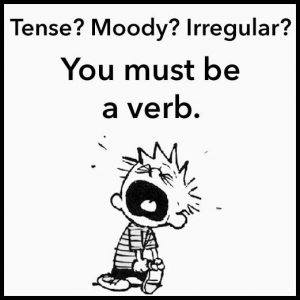by Gabrielle C. Durham
 We can agree that a verb in the present tense means that action is occurring now. What about the present progressive, which I used in the previous statement? That apparently confounds non-native English speakers because it means that an action is in the middle of happening. Friends have asked me, “What is the difference between I am playing tennis and I play tennis?” That example is actually a softball because the present progressive indicates that the first person is in the middle of playing a game and the simple present indicates the playing of the sport in general.
We can agree that a verb in the present tense means that action is occurring now. What about the present progressive, which I used in the previous statement? That apparently confounds non-native English speakers because it means that an action is in the middle of happening. Friends have asked me, “What is the difference between I am playing tennis and I play tennis?” That example is actually a softball because the present progressive indicates that the first person is in the middle of playing a game and the simple present indicates the playing of the sport in general.
This feeling of verbal instability perhaps approaches the bewilderment I still feel with some verbs in Russian when deciding whether to use perfect versus imperfect (honestly, not that common an occurrence, put play along with me, please). I understand when Misha went by train to Novgorod yesterday, no sweat. It’s when he ate a 3-day feast beforehand that I start getting itchy palms. Yes, the verb is in the perfect, or completed, past tense, but that piggish boy just kept engaging in the activity for 72 hours. Would you use the perfect or imperfect past? You could make a persuasive argument for either. According to the Oxford Dictionary, we can break this use of tense down to aspect, which would be either continuous or perfect.
So what does tense tell us? Verb tense refers to when a subject performed an activity (the verb). Easy, peasy, right? Not really if you start talking about other things that happened in relation to that time. That’s where pluperfects and subjunctives, among other infernal entities, come into play.
Fatima had already finished her ablutions when her pet macaw began to chitter.
When João was still a little boy, long ago and far away, he had already lost his faith that light would prevail in man’s struggle with his own dark nature.
When considering past tenses, we may think it is cut and dried—that an action that has already occurred is in the past—but a question remains: How far past? Robertson Davies had a story about the use of the past tense in Welsh in which Welsh speakers talk about the Romans in the recent past, despite their having been gone from Caerphilly for more than a millennium. In English, there are no markers of how far in the past an action occurred. That is why we have the pluperfect, or the really past for the more informal among us. The pluperfect is the had + past tense: I had gone to bed every night by 2:30 am like a good drunkard when Schopenhauer changed everything.
And let’s not forget the conditional: the woulda, the coulda, and the shoulda. The conditional tense is actually future past. I will read Guide for the Perplexed by Maimonides tomorrow becomes I would read Guide for the Perplexed by Maimonides if I had more time and the inclination to do so. One of my pet peeve conditional sentences starts, “I would like to thank . . .” Why state a preference for showing gratitude instead of just doing it directly? Why not “Thank you, Esteemed Human”?
Speaking of the future in a more predictive capacity, future tense refers to actions that have not yet occurred but are expected or likely to happen, such as public transportation schedules, weather, and duties. When we hope, we use the future tense.
We talked about verb tense and aspect; so, what is left? There’s voice, and the typical example, albeit a not terribly precise one, is the use of active versus passive. What is left is mood. In English, we have the indicative, imperative, and subjunctive moods, and two of these three are self-explanatory. The subjunctive mood is not common, and it is used to convey the hypothetical or not yet occurred as a hope or a doubt. The phasing out of the subjunctive may tell us something about the state of English, especially in comparison to its continued vibrancy in French and Spanish, but I’m not sure I want to speculate on what that something is. Most of us would struggle to identify a subjective (versus indicative) verb. Examples of the subjunctive are If I were you or Come what may.
Tenses in ancient Greek and Arabic such as aorist and jussive are a different party line. Maybe we’ll get down with those next month.
We tend to hopscotch through verb tenses in our speech and writing and prefer to be unburdened by thinking overly about such matters. Here’s hoping you had a little fun thinking about our friend the verb in all its multifarious glory with me.
